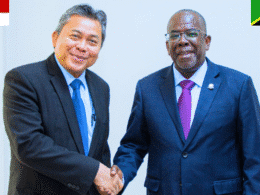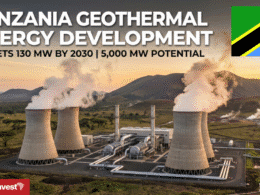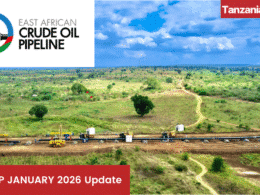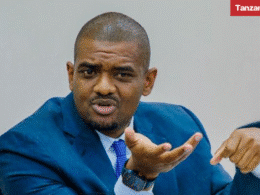TanzaniaInvest had the pleasure of interviewing Felix Ngamlagosi, Director General of Tanzania’s Energy & Water Utilities Regulatory Authority (EWURA). Mr. Ngamlagosi discusses the country’s hunger for energy and water, the investment opportunities available in power production and the new model power purchase agreements to streamline negotiations with Tanzania Electric Supply Company TANESCO.
EWURA is responsible for technical and economic regulation of the electricity, petroleum, natural gas and water sectors in Tanzania.
EWURA is also responsible for promoting effective competition and economic efficiency, protecting the interests of consumers and promoting the availability of regulated services to all consumers including low income, rural and disadvantaged consumers in the regulated sectors.
The functions of EWURA include among others, licensing, tariff review, monitoring performance and standards with regards to quality, safety, health and environment.
Tanzania Invest: Increasing electricity capacity from the current 1.6 Megawatts is key to accomplishing the socio-economic development contained in Tanzania’s 2025 vision. From a regulatory perspective, what are you doing to accompany the development of this capacity?
Felix Ngamlagosi: The ambition of this government is to ensure that Tanzania becomes a middle-income economy as soon as possible.
For that ambition to be met, one of the drivers is availability of adequate, reliable and affordable electricity.
Within this framework, EWURA undertakes technical and economic regulation of electricity: we review electricity tariffs, approve power purchase agreements, review technical issues related to safety as well as standards of electricity and connectivity within the systems and resolve conflicts between suppliers and customers.
We also assist in promoting investments in electricity, as they are critically needed.
There is a contribution from the government, but the government alone cannot afford to meet the growing energy demand, so private participation is vital. For the private sector to decide to invest in Tanzania, there must be an attractive environment for them to choose Tanzania as their destination.
We have worked on areas that will ease the entry of the private sector and have tried to assist in reducing time for negotiation of price, for example, between the developers and the off-taker, TANESCO, the Tanzania Electric Supply Company.
TI: How have you reduced the negotiation time between independent power producers and TANESCO?
FN: Firstly, we have prepared model Power Purchase Agreements (PPAs) to reduce the time spent in negotiating agreements.
We looked at reasons why TANESCO and the developers take too long in negotiating and agreeing on a power purchase agreement.
We saw that TANESCO received many prospective investors, from different countries, each with a different draft power purchase agreement, based on the law of their origin, for TANESCO to review.
That takes a lot of time for TANESCO to comprehend and then form a position on that negotiation. To resolve that and ease negotiations we have developed model power purchase agreements for different technologies.
The sector technology-specific model power purchase agreements are for power generation projects from natural gas, oil, hydro, solar, wind, geothermal and coal.
These are not standard agreements but are models, in the sense that, if there is a certain section in the agreement that parties needs to change, that would be a case to be reviewed by EWURA, which can then give the go-ahead if it doesn’t have any effect on third parties.
Investors are now able to just download the model power purchase agreement on the technology that they intend to use and that is a starting point for negotiations with the utility that they sign the power/energy sale contract with.
TI: What has been the feedback from investors on these new model power purchase agreements?
FN: The model power purchase agreements have eased a lot in terms of time spent by investors and TANESCO in negotiating and has received very good feedbacks.
In fact, the preparation of the model power purchase agreements was very much a consultative process with current and prospective investors and key stakeholders.
Power production in Tanzania is now much more predictable because investors know in advance what kind of contract is likely to be negotiated.
The few things that are sector-specific, location-specific and technology-specific like size of plant are left for the parties to negotiate.
We have also prepared what we call indicative cap prices to allow utility to have this information before hand and avoid entering into lengthy negotiations that may fail to lead to a deal because of pricing issues.
Overall, what we are doing is to reduce time for negotiation, reduce time for decision making by investors so that they make easy entry into the economy of Tanzania and generate power, which we need.
TI: EWURA is also responsible for promoting the availability of regulated services to rural consumers? What are you doing in relation to rural electrification in Tanzania?
FN: Similarly to what we have done for large energy developers linking up to TANESCO’s power grid, we have prepared a standard agreement with standard tariff for energy projects smaller than 10 Megawatts.
These projects are mostly in remote rural areas, using mini hydro, solar and biomass power plants, in locations where it will take many years before TANESCO’s power grid becomes available.
The initiative is part of the Small Power Projects Programme (SPP) that is designed to attract renewable energy developers, especially from local investors which may have the investment capacity for such small projects but may lack the capacity to negotiate a Power Purchase Agreement (PPA) with TANESCO.
Therefore, through consultative processes with key stakeholders, including the private sector, lenders and the government, EWURA has prepared a standard agreement and a standard tariff computation mechanism.
The tariff will be fixed and known beforehand and it is announced every year by EWURA.
The first SPP programme has lasted for about 6 years and we have seen a number of projects taking place. At the moment, there are 8 projects that are already up and running and are generating power, and another 20 projects in different stages of preparation.
Some of them are generating power and selling it to local communities, but with TANESCO being the main customer.
However, under the first SPP Programme many developers were complaining that the framework was more focused on hydro or co-generation biomass projects but was not supportive of other technologies like wind and solar.
The framework was also pegged on Tanzanian shillings; therefore, the developers were complaining of risk for investment because of the exchange rate exposure.
TI: How have you adapted the regulatory framework to make it more supportive to the development of renewable energy projects?
FN: Under this second phase of the SPP programme which started in April 2015, we are tackling some of the challenges faced by energy developers under phase 1.
Under phase 2 of the SPP programme, we have introduced a standard agreement specific for hydro and a standard agreement specific for biomass, and corresponding standard tariffs at different capacities Renewable Energy Feed-in Tariffs (REFIT); with the framework still covering small projects of less than 10 Megawatts in Tanzania.
We had also tried to prepare a standard agreement and a standard framework for solar and wind.
However, because of technical variations of the same technology even in the same location, it was not possible to prepare a standard agreement and a standard tariff for the same.
So, on 29th of February, 2016, EWURA’s board approved a small SPP framework for solar and wind energy production which is going to be procured competitively, via a competitive bidding process.
This framework does apply to projects of capacities more than 1 MW up to the 10 MW thresholds. The smaller projects of 1 MW and below will not be subjected to competitive bidding, but will have a REFIT calculated for Main grid and Isolated Mini-grid connected projects.
Under the competitive bidding framework TANESCO will announce the requirements, on- grid or off-grid, for 2016 for solar and wind power generation.
Developers willing to generate solar and wind power on the areas designated by TANESCO will be required to compete and will be selected on the least cost and the ability to do the projects.
That is an innovation to attract investors in renewable energies projects – wind and solar – which has not been tapped through the generic SPP framework.
That is another window of easing and transparently making things happen in terms of attracting investors in power generation in Tanzania.
TI: Where do you see the most interesting investment opportunities in energy production in Tanzania?
FN: The current energy demand in Tanzania is actually suppressed and with rural electrification developing very fast, more customers and, therefore, more demand is adding up.
The Tanzanian economy is growing at around 7% per year and it has been growing so for the past 10 years and we are predicting that it will continue, if not increase above 7% for the coming 10 years or so, which means the demand for power in this country is going to grow significantly.
And that demand represents opportunities for investment, in almost all power technologies.
We have not done much in generating power from natural gas and it is an area where we still need a lot more investment.
We still have a lot of potential which has not been tapped in hydro which is both clean and can have double benefit in terms of flood control and irrigation programmes.
Coal generation is the next big area that we should be moving into as the potential is substantial, and can be a good base load resource, which also can stabilize the cost of generation in Tanzania.
Geothermal is just coming in, exploration is going on but that is certainly going to be our next area.
Wind and solar are obvious. TANESCO and private companies have done several studies indicating that the potential is there.
So, opportunities for power generation are enormous in Tanzania.
The potential for sale of electricity beyond Tanzania is also enormous and those are opening very soon, as interconnecting infrastructures are either under construction or plans are at an advanced stage.
The generation segment is however much more open for the private sector to come in, and the environment as we can see, is supportive.
TI: Tanzania’s proven reserves of natural gas have reached 55 trillion cubic feet. How do you ensure that the gas that will be extracted will be used for local energy production and not just be sold to international markets?
FN: The government has prepared what is called “Gas Utilization Master Plan”: it elaborates on exactly how the natural gas that is discovered in Tanzania is going utilised.
In it there is a significant emphasis on the use of the natural gas locally – to support the local economy – for different uses: power generation, fertilizers, petrochemicals and other uses, including domestic uses.
That said, to recover the investments that have been made and that will continue to be made in the natural gas exploration, development and production, the bigger portion of gas may well be directed to the foreign markets.
The discoveries that have been made are significantly large and will push the economy of this country for many more years to come.
Selling to foreign markets is also, in a way, coming back to push the economy of this country and pay back the investor’s capital adequately.
Otherwise, if you don’t pay the investor’s capital, you are not assisting the country and you are not assisting the industry, and the sector will not grow because we need more investments. Returns must be assured.
TI: EWURA also regulates the water sector. What is the situation of water and sanitation services and what are the investment opportunities in this sector in Tanzania?
FN: With respect to water, there has been a significant achievement: the public is now much more cognizant of the fact that the supply of water and sanitation services is costly and it has to be paid for.
We are coming from a situation where water supply and sanitation services were considered free.
Secondly, there are government programs of rehabilitating much of these infrastructures in many cities as well as rural areas.
But, although new investments have been made in the past 10 years and will continue to be made, there could be areas where water production is not enough to satisfy the demand.
And that requires both improving service delivery and changing the pricing or tariffs.
To this regard EWURA has been gradually increasing water tariffs, without which operational maintenance would be difficult.
In previous years, having tariffs which are below cost reflective tariffs led to utility companies relying on subsidies from the government.
And if there is no subsidy, the service deteriorates and this raises more complaints from the consumers, and therefore, willingness to pay goes down.
Tariffs must be fully covering the cost, so that utility companies are able to rehabilitate the water schemes or even make extensions.
So, there is need for continued investment in these areas.
But there is also the need to continue pushing the management of these utilities to be more commercially oriented, and the mind-set is changing fast.
Most of the water utilities now have cost reflective tariffs and are able to operate in maintenance and do some minor investments.
TI: All in all, would you say the situation as it is now, with the latest changes in the regulatory framework, is enough to make Tanzania the hotspot in this region for investments in electricity and water?
FN: Yes, because we are also getting feedback from investors.
We are not alone in this region and investors go from one country to another and compare opportunities and regulations.
The innovative level of transparency that EWURA has introduced is attracting investors and this is an indication that Tanzania is becoming a hotspot in terms of investments in these two sectors: electricity and water.
EWURA, in May, 2015, received the “Regulator of the Year” award by EnergyNet of UK at the Power Africa forum which was held in Dubai.
The award was in recognition for a regulator who has been transparent and clear – it was about clarity to investors when it comes to what we do, how we do it and how we involve stakeholders in all the processes.
Again, that makes a difference as to whether we are really ready to receive and attract investors in Tanzania, and yes, we are ready.











